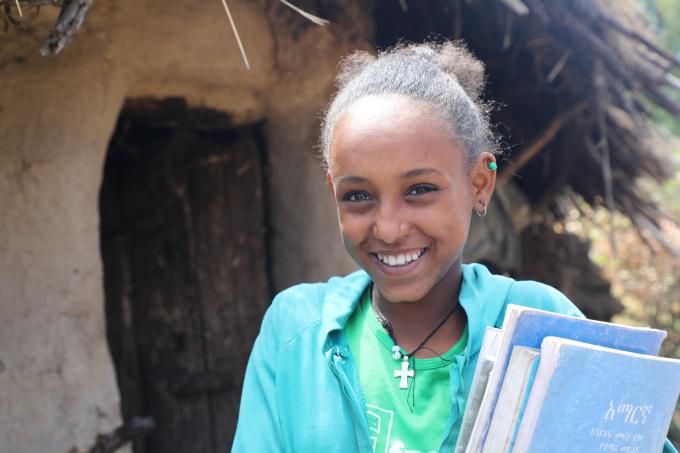A Teenage Girl against the World: Birq’s Story
Since February 2015, Save the Children in Ethiopia has been implementing Promoting Sexual and Reproductive Health and Family Planning Services for Marginalized Women and Girls (Yaflanet Hiwot II plus), The EU supported Sexual and Reproductive Health program operates in Amhara and Afar Regional States with special emphasis on marginalized women and girls. The overall objective of the project is to contribute to an improvement of the wellbeing of the most vulnerable communities in Ethiopia through better sexual and reproductive (SRH) services and informed family Planning (FP) choices.
Most people do not have the slightest clue about how hard it is for a rural teenage girl to convince her family not to marry her off at an early age. It is even harder when the girl happens to live in a family where the mother and her first born were both married at 10. This story is about a girl child who is in a similar situation but worse.
Birq Belay is a 14-year-old girl who lives 35 km off the main road in the deep rural village of Abiya in the Waghemera zone of Amhara region, Ethiopia. She has nine siblings among which the eldest daughter unfortunately got married at ten and now has four kids. Adding the fact that her mother was married at ten as well, the only natural step coming up for Birq seemed merely following the footsteps of the two older females in the family.
Four years ago, when Birq turned ten they wanted to marry her off to a man whose parents are friends of the family. “There was this party at our place where mom had promised to give my hand in marriage. When I was a kid, this family brought me twice all sorts of attires including dresses, headbands, sashes and even shoes,” she reminisces. Unsuspecting Birq seemed like she never talked enough about it while showing off her bride price to friends and uttering words that could alter her life forever, “look what my in-laws brought me!”
By the time the marriage was about to happen, she was older and had already started participating in the school Sexual and Reproductive Health (SRH) club. As soon as she was aware of what has been planned for her she immediately reported it to the club and they called her father to her school. Convincing her father was not an easy task but it was not impossible. What was more difficult was for the family to inform their would-be-in-laws that the marriage has been called off at the risk of becoming an outcast. They demanded they should be paid back after which the village elders gathered and calculated the costs incurred. Birq’s father paid the money back.
In the four years that followed, the idea of marriage appeared several times in the house. But articulate Birq averted it all single handedly arguing against it using the knowledge she gained from the SRH club. “My participation in the SRH club helps me continue my education. I know a husband would have never let me go to school.” She also learned in the club about the dangers of FGM, and other harmful traditional practices.
The project has established two hundred in-school SRH clubs across all interventions that are playing key roles in reaching school communities through counselling corners and peer-counselling services. Sexual and Reproductive Health, Women Role and Wellbeing, Family planning, prevention of unsafe abortion, menstrual cycle for girls, HTP with a specific focus on early marriages and other SRH related matters are the main areas of sensitization and counselling.
For five consecutive years, the idea of marriage appeared several times in Birq’s home but she averted it all arguing against it using the knowledge she gained from the SRH club.
Not only is Birq a member of the school SRH club but she is also an active member of other clubs half a dozen in number. She is in the mini-media club, the Child Parliament and the anti-HIV club to name a few. Back at home, she helps out her mother with household chores. Her daily routine include baking injera [Ethiopian flat bread], cleaning the house and helping out at the farm. Besides, she carries a back breaking 20 liters jerry can full of water and walks for more than 15 minutes. Unbelievably, she seems unaffected by all of these challenges and is always top of her class.
Her diligence never passed unrecognized by her mother Zenebu Dessalegn. “I know my daughter is excellent at everything. Although our times were bad and I had to marry at an early age only to give birth to 15 children, Birq here is going to go places. I have high hopes for her”.
Birq regularly teaches about SRH issues at the daily line-up schedules and school events like parents’ day. After exerting her efforts for years now, Birq is certain to comment that “now everyone is aware.”
Yaflanet Hiwot II plus project directly targets 1,200,000 marginalized and vulnerable women and adolescents aged 15-49 years with a special focus on 144,000 adolescent girls aged 15-19. The project employs different approaches including stepping stone, community conversation; and in and out of school clubs to reach the target groups.
 Ethiopia
Ethiopia 